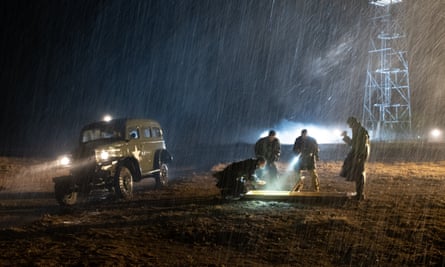Oppenheimer review – Nolan’s atom bomb epic is flawed but extraordinary
Wednesday 19 July 2023
Christopher Nolan’s account of the physicist who led the Manhattan Project captures the most agonising of success stories
The wartime Soviet intelligence services had a codename for the Manhattan Project, the US’s plan to build an atom bomb: Enormoz. Christopher Nolan’s new film about it is absolutely Enormoz, maybe his most enormoz so far: a gigantic, post-detonation study, a PTSD narrative procedure filling the giant screen with a million agonised fragments that are the shattered dreams and memories of the project’s haunted, complex driving force, J Robert Oppenheimer, a brilliant physicist with the temperament of an artist who gave humanity the means of its own destruction.
The main event is that terrifying first demonstration: the Trinity nuclear test in the New Mexico desert in July 1945, when Oppenheimer is said to have silently pondered (and later intoned on TV) Vishnu’s lines from the Hindu scripture, the Bhagavad-Gita: “Now I am become Death, the destroyer of worlds …”
This is the big bang, and no one could have made it bigger or more overwhelming than Nolan. He does this without simply turning it into an action stunt – although this movie, for all its audacity and ambition, never quite solves the problem of its own obtuseness: filling the drama at such length with the torment of genius-functionary Oppenheimer at the expense of showing the Japanese experience and the people of Hiroshima and Nagasaki.
Nolan moves back and forth in time, either side of the historic 1945 firebreak, giving us Oppenheimer’s beginnings as a young scientist, lonely and unhappy, electrified by the new developments in quantum mechanics, the young leftist who never became a Communist party member but whose anti-fascism galvanised his desire to develop the bomb before the Nazis could, directing the work of hundreds of scientists.
Later in the 50s, there is the disillusioned, compromised administrator, hounded by the McCarthyites for his communist connections, nauseated by his own pointless celebrity, by his failure to establish postwar international atomic control and by a single denied thought: the Nazis surrendered long before there was any suggestion they had the weapon, and bombing the defeated Japanese at Hiroshima and Nagasaki was merely to cow the Russians with a ruthless demonstration of the US’s nuclear mastery.
Cillian Murphy is an eerily close lookalike for Oppenheimer with his trademark hat and pipe, and is very good at capturing his sense of solitude and emotional imprisonment, giving us the Oppenheimer million-yard stare, eyeballs set in a gaunt skull, seeing and foreseeing things he cannot process.
Matt Damon is the boorish Lt Gen Leslie Groves, Oppenheimer’s exasperated military minder; Kenneth Branagh is his genial scientific hero and mentor Niels Bohr; Robert Downey Jr is the duplicitous Atomic Energy Commission chairman Lewis Strauss; Florence Pugh plays his lover Jean Tatlock, whose heart he broke, while Emily Blunt is his wife, Kitty, also badly treated. Tom Conti plays the sorrowfully detached Albert Einstein, and it has to be said that Nolan, rightly or wrongly, uses non-Jewish actors for Oppenheimer and Einstein, two of the most famous Jewish people in history and in fact doesn’t quite get to grips with the antisemitism that Oppenheimer faced as an assimilated secular American Jew.

There is a horribly gripping scene showing Oppenheimer’s formative experience as an unhappy graduate student in England at Christ’s College, Cambridge. He suffered what amounted to a psychotic breakdown and left a poisoned apple on the desk of his testy supervisor Patrick Blackett (James D’Arcy), which Blackett fortunately didn’t notice and didn’t eat. Nolan coolly invites to see this as a parable for the lost Eden of a more innocent prewar physics, with Oppenheimer as a serpent with Adam’s foolish innocence. And of course there is the creeping biographical irony: how terribly close Oppenheimer came to … killing someone.



No comments:
Post a Comment